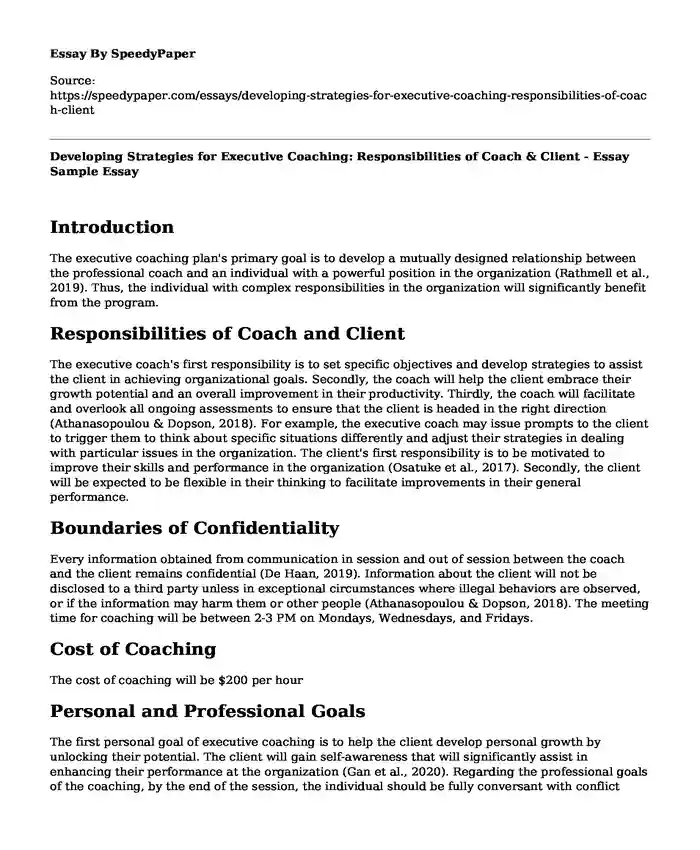Introduction
The executive coaching plan's primary goal is to develop a mutually designed relationship between the professional coach and an individual with a powerful position in the organization (Rathmell et al., 2019). Thus, the individual with complex responsibilities in the organization will significantly benefit from the program.
Responsibilities of Coach and Client
The executive coach's first responsibility is to set specific objectives and develop strategies to assist the client in achieving organizational goals. Secondly, the coach will help the client embrace their growth potential and an overall improvement in their productivity. Thirdly, the coach will facilitate and overlook all ongoing assessments to ensure that the client is headed in the right direction (Athanasopoulou & Dopson, 2018). For example, the executive coach may issue prompts to the client to trigger them to think about specific situations differently and adjust their strategies in dealing with particular issues in the organization. The client's first responsibility is to be motivated to improve their skills and performance in the organization (Osatuke et al., 2017). Secondly, the client will be expected to be flexible in their thinking to facilitate improvements in their general performance.
Boundaries of Confidentiality
Every information obtained from communication in session and out of session between the coach and the client remains confidential (De Haan, 2019). Information about the client will not be disclosed to a third party unless in exceptional circumstances where illegal behaviors are observed, or if the information may harm them or other people (Athanasopoulou & Dopson, 2018). The meeting time for coaching will be between 2-3 PM on Mondays, Wednesdays, and Fridays.
Cost of Coaching
The cost of coaching will be $200 per hour
Personal and Professional Goals
The first personal goal of executive coaching is to help the client develop personal growth by unlocking their potential. The client will gain self-awareness that will significantly assist in enhancing their performance at the organization (Gan et al., 2020). Regarding the professional goals of the coaching, by the end of the session, the individual should be fully conversant with conflict management, stress management, and team and team development (Athanasopoulou & Dopson, 2018). Secondly, their emotional intelligence will grow, thus enabling them to make better decisions for the company's benefit. The executive coaching will ensure senior team strategy and succession planning, whereby new leaders will be identified and developed.
Timeline
The coaching process will take three months, with coaching taking place three times every week.
Check-In Points
Continuous assessment primarily rough observation will be carried out during the executive coaching process to check the individual's progress and identify any loophole in the training (Rekalde et al., 2017). It is essential to know what is working for the client and what is not so that different strategies can be used to reach the desired goals and objectives (Osatuke et al., 2017). Furthermore, the individual must report if they feel they are making any progress or the coach to devise other methods to achieve the desired goals.
Guidelines for Leaving the Coaching Relationship
The process of leaving the coaching relationship will be strategic and systematic. The client will use the skills learned from the training to manage conflicts in the organization, build and guide teams, and use their enhanced emotional intelligence to associate with other employees (De Haan, 2019). The future goal is to develop highly-skilled leaders to take the organization to the next level.
References
Athanasopoulou, A., & Dopson, S. (2018). A systematic review of executive coaching outcomes: Is it the journey or the destination that matters the most? The Leadership Quarterly, 29(1), 70-88.
De Haan, E. (2019). A systematic review of qualitative studies in workplace and executive coaching: The emergence of a body of research. Consulting Psychology Journal: Practice and Research, 71(4), 227.
Gan, G. C., Chong, C. W., Yuen, Y. Y., Yen Teoh, W. M., & Rahman, M. S. (2020). Executive coaching effectiveness: Towards sustainable business excellence. Total Quality Management & Business Excellence, 1-19.
Osatuke, K., Yanovsky, B., & Ramsel, D. (2017). Executive coaching: New framework for evaluation. Consulting Psychology Journal: Practice and Research, 69(3), 172.
Rathmell, W. K., Brown, N. J., & Kilburg, R. R. (2019). Transformation to academic leadership: The role of mentorship and executive coaching. Consulting Psychology Journal: Practice and Research, 71(3), 141.
Rekalde, I., Landeta, J., Albizu, E., & Fernandez-Ferrin, P. (2017). Is executive coaching more effective than other management training and development methods? Management Decision.
Cite this page
Developing Strategies for Executive Coaching: Responsibilities of Coach & Client - Essay Sample. (2023, Nov 15). Retrieved from https://speedypaper.com/essays/developing-strategies-for-executive-coaching-responsibilities-of-coach-client
Request Removal
If you are the original author of this essay and no longer wish to have it published on the SpeedyPaper website, please click below to request its removal:
- Free Essay on Education
- Personal Statement Essay Sample: Information Security
- Tissue Family Reunion - Free Essay
- Distinctions Between Qualitative and Quantitative Methods - Essay Sample
- High-Tech Crimes - Essay Sample
- Essay Sample on Identifying Non-Academic Distractions
- Technology's Contribution In Education: Essay Sample To Read And Analyze
Popular categories





